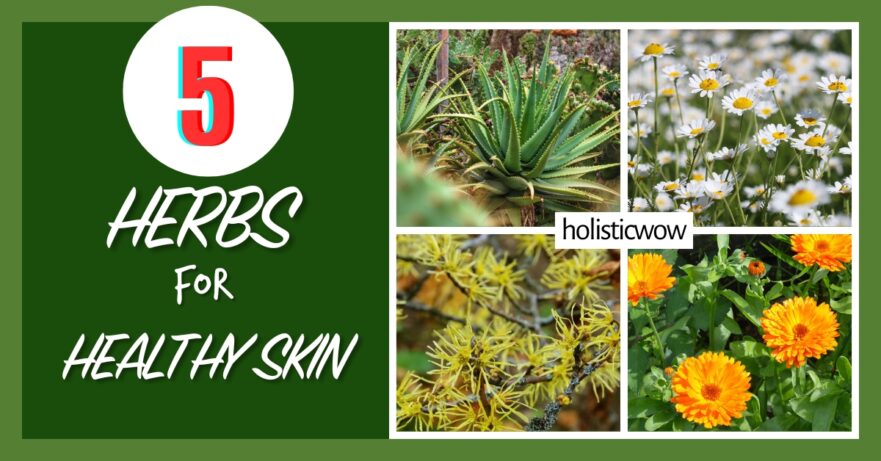In this article about herbs for skin:
🌿 Herbs for Skin Health | 📜 Herbal Preparations and Recipes for Skin Health | ☯️ Integrating Herbs into Daily Life for Skin Health | 🌱 Navigating Herbs Safely
Skin problems can range from minor irritations to chronic conditions, affecting daily life and self-esteem. Common issues include acne, eczema, dryness, and inflammation, which can cause discomfort, redness, and itching. These concerns often stem from environment, diet, and genetics.
Herbs offer natural solutions for many skin issues. Aloe vera soothes and hydrates, while chamomile reduces inflammation. Calendula promotes healing, lavender balances oil production, and witch hazel tightens pores. These herbs provide gentle yet effective care for various skin types and concerns.
Understanding how these herbs work allows for creating a personalized skincare routine. Incorporating these natural remedies can address specific skin issues and improve overall skin health, leading to a clearer, more radiant complexion.
Key Takeaways
- 🌼 Powerful Natural Remedies: Aloe vera, chamomile, calendula, lavender, and witch hazel offer gentle, effective support for various skin concerns.
- 💆 Soothing Properties: These herbs provide anti-inflammatory, hydrating, and soothing benefits for common skin issues like acne, eczema, and minor irritations.
- 🧴 Easy Integration: Herbal preparations can be seamlessly incorporated into daily skincare routines using cleansers, toners, and moisturizers.
- ✨ Complementary Practices: Combining herbal skincare with a nutrient-rich diet, hydration, and stress management promotes optimal skin health.
- 🌿 Safety Considerations: While generally safe, patch-testing new herbal products and consulting a healthcare provider is recommended, especially for sensitive or reactive skin.
🌿 Herbs for Skin Health
Skin issues can range from minor irritations to chronic conditions that affect daily life. Aloe vera (Aloe barbadensis miller), chamomile (Matricaria recutita), calendula (Calendula officinalis), lavender (Lavandula angustifolia), and witch hazel (Hamamelis virginiana) are some of the most commonly used herbs for skin health due to their anti-inflammatory, soothing, and wound-healing properties.
Skin problems can manifest in various ways, including redness, itching, dryness, and inflammation. Environmental stressors, allergies, or underlying health conditions can cause these symptoms. Acne vulgaris, a common skin concern, occurs when hair follicles become clogged with oil, bacteria, and dead skin cells, leading to pimples, blackheads, or whiteheads. Eczema (Atopic Dermatitis), another prevalent skin condition, causes dry, itchy, and inflamed patches of skin due to an immune system response to irritants or allergens.
Psoriasis, characterized by red, scaly patches, results from an autoimmune condition that accelerates skin cell turnover, leading to the buildup of skin cells on the surface. Sunburns, caused by overexposure to ultraviolet (UV) rays, can lead to painful, red skin and increase the risk of skin cancer and premature aging. Minor cuts and wounds, while common, require proper care to prevent infection and promote healing.
Understanding these skin issues and their causes is crucial for selecting appropriate herbal remedies and developing an effective skincare routine. Many people find relief and improved skin health by addressing these concerns with scientifically supported natural solutions.
Aloe vera (Aloe barbadensis miller)
Aloe vera (Aloe barbadensis miller) has been used for thousands of years for its medicinal benefits, particularly for skin health. Known for its wound-healing and hydrating properties, it has shown promise in treating sunburns and minor cuts and may speed up the healing of first- and second-degree burns. Aloe vera may also help alleviate symptoms of psoriasis, though its effectiveness in this area remains varied. Its moisturizing properties help keep skin hydrated and may enhance skin elasticity by stimulating collagen and hyaluronic acid production, as demonstrated in studies involving aloe sterols. Additionally, it has been shown to reduce pain, promote faster healing, and soothe irritated skin in post-surgical wound care, as demonstrated in patients recovering from hemorrhoidectomy. While further research is needed to validate these benefits fully, current evidence suggests that aloe vera could be a valuable natural remedy for various skin conditions.
Chamomile (Matricaria recutita)
Chamomile (Matricaria recutita) has been used for centuries for its calming and anti-inflammatory benefits. Chamomile is recognized in herbal medicine for promoting skin healing and supporting wound care through its soothing and therapeutic effects, which may benefit skin health. Research shows that chamomile may help reduce inflammation in eczema by calming pathways in the body that lead to redness and swelling. By lowering levels of specific inflammatory substances, it may help ease symptoms of eczema. Chamomile essential oil also shows promise in relieving psoriasis-like skin irritation by calming inflammation pathways, which helps reduce redness and swelling.
Calendula (Calendula officinalis)
Calendula (Calendula officinalis), also known as marigold, has been valued for centuries in traditional medicine for its skin-healing properties. Its bioactive compounds, including flavonoids, terpenoids, and carotenoids, are known for therapeutic benefits. Studies suggest that calendula can support wound healing, particularly by speeding up the healing process in acute wounds. This may make it especially beneficial for damaged skin needing repair. In addition, calendula extract has shown significant benefits in improving skin hydration and firmness, which can help maintain skin health and elasticity. Calendula’s anti-inflammatory properties may help soothe inflamed skin, making it useful for minor skin irritations. Its ability to reduce inflammation-related compounds supports its role in skincare products for calming and protecting sensitive or irritated skin. Calendula’s gentle, soothing action is ideal for skin care, where it can calm sensitive skin, reduce redness, and improve the skin’s appearance by reducing inflammation and irritation.
Lavender (Lavandula angustifolia)
Lavender (Lavandula angustifolia) has been valued for its calming and skin-soothing properties. Key compounds in lavender, such as linalool and linalyl acetate, contribute to its anti-inflammatory, antimicrobial, and calming effects, which support stress relief and may indirectly benefit skin health. Lavender’s anti-inflammatory and antimicrobial properties in skincare make it potentially beneficial for acne-prone and sensitive skin. Lavender oil may help reduce redness in inflamed skin, support wound healing through collagen production and tissue remodeling, and soothe irritated skin. Lavender’s gentle scent also promotes relaxation, which may further benefit skin health by reducing stress.
Witch hazel (Hamamelis virginiana)
Witch hazel (Hamamelis virginiana), traditionally used by Native Americans, is valued for its medicinal properties. Witch hazel contains bioactive compounds, primarily tannins (like hamamelitannin) and flavonoids, which are believed to contribute to its therapeutic effects. Clinical studies suggest that witch hazel extract has anti-inflammatory properties, which may help soothe mild skin irritation and redness. In UV-induced erythema tests, lotions containing 10% witch hazel distillate were found to significantly reduce skin redness and inflammation, indicating its usefulness in after-sun and soothing skincare products. For oily and acne-prone skin, witch hazel’s anti-inflammatory properties may help reduce acne-related inflammation and soothe irritated skin. Its antioxidant effects also offer some protective benefits against inflammatory responses, supporting its inclusion in skincare formulations aimed at calming and refreshing the skin.
📜 Herbal Preparations and Recipes for Skin Health
To address various skin issues, we have developed specific herbal recipes that incorporate the gentle properties of selected herbs. Each blend aims to support skin health, offering soothing relief and nourishment. Whether dealing with dryness, mild irritation, or seeking general skin wellness, these preparations provide gentle, plant-based remedies.
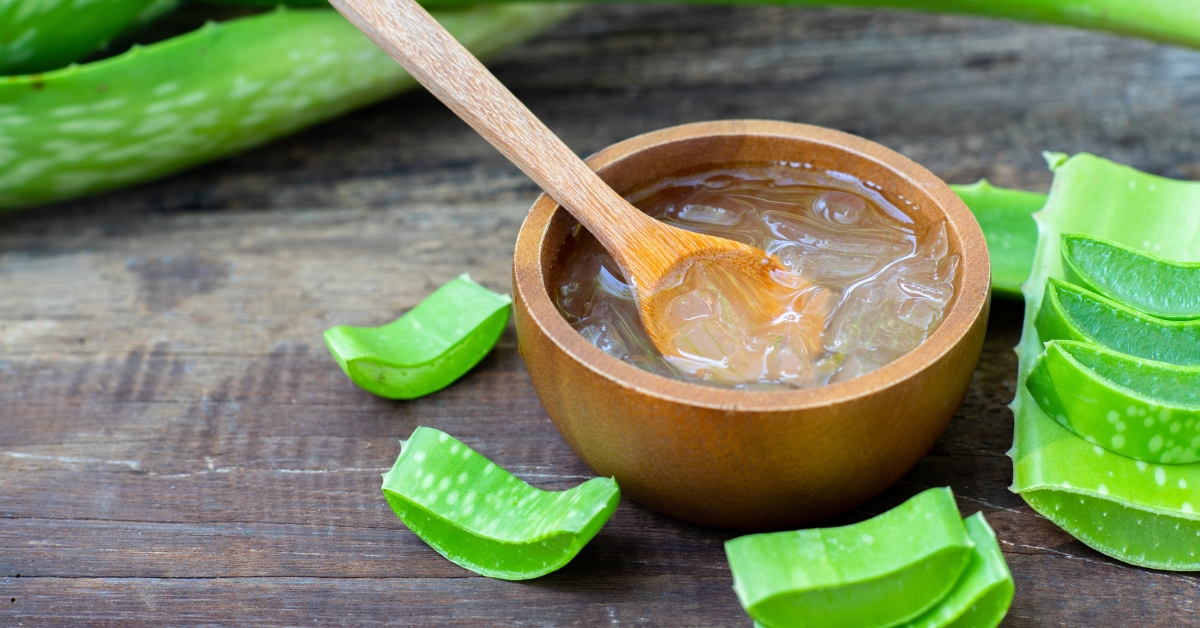
Soothing Skin Gel
Ingredients:
- 2 tablespoons aloe vera gel
- 1 tablespoon witch hazel extract
- 1 teaspoon chamomile infusion (made from 1 teaspoon dried chamomile flowers steeped in 1/4 cup hot water for 10 minutes, then strained and cooled)
Preparation:
- Mix all ingredients in a small bowl.
- Apply to clean skin twice daily for temporary relief from minor irritations and to soothe mildly sensitive skin.
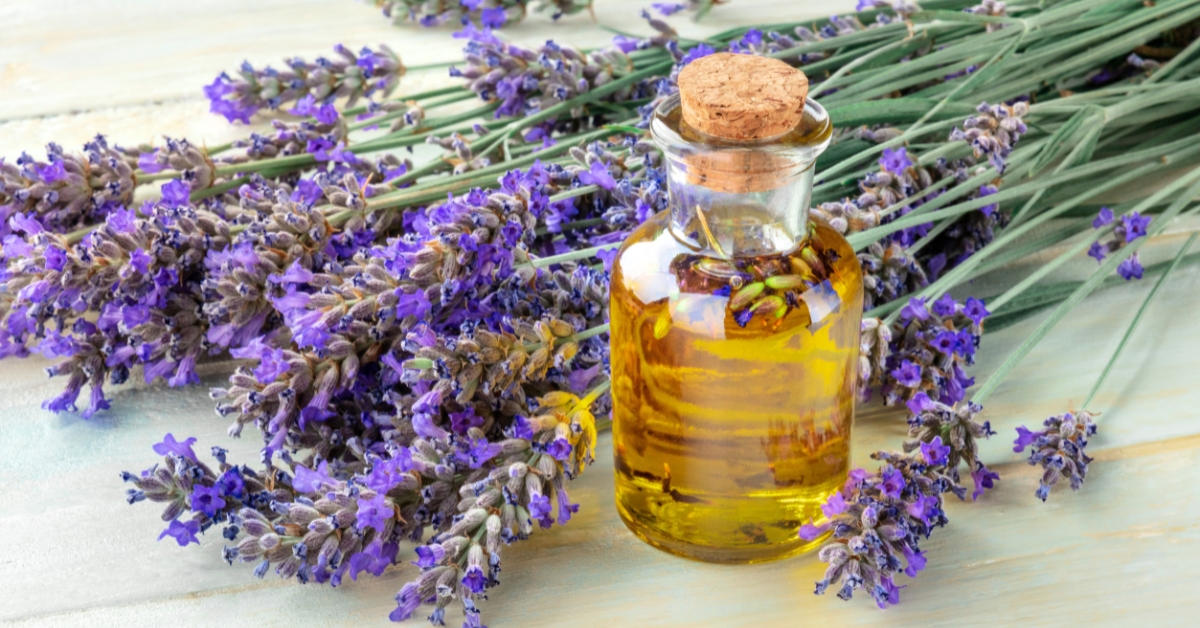
Calming Facial Mist
Ingredients:
- 1/4 cup witch hazel extract
- 1/4 cup chamomile infusion (prepared as above)
- 3 drops lavender essential oil
- 1/4 cup distilled water
Preparation:
- Combine all ingredients in a spray bottle.
- Shake well before each use.
- Mist onto clean face morning and night to help refresh and calm the skin.
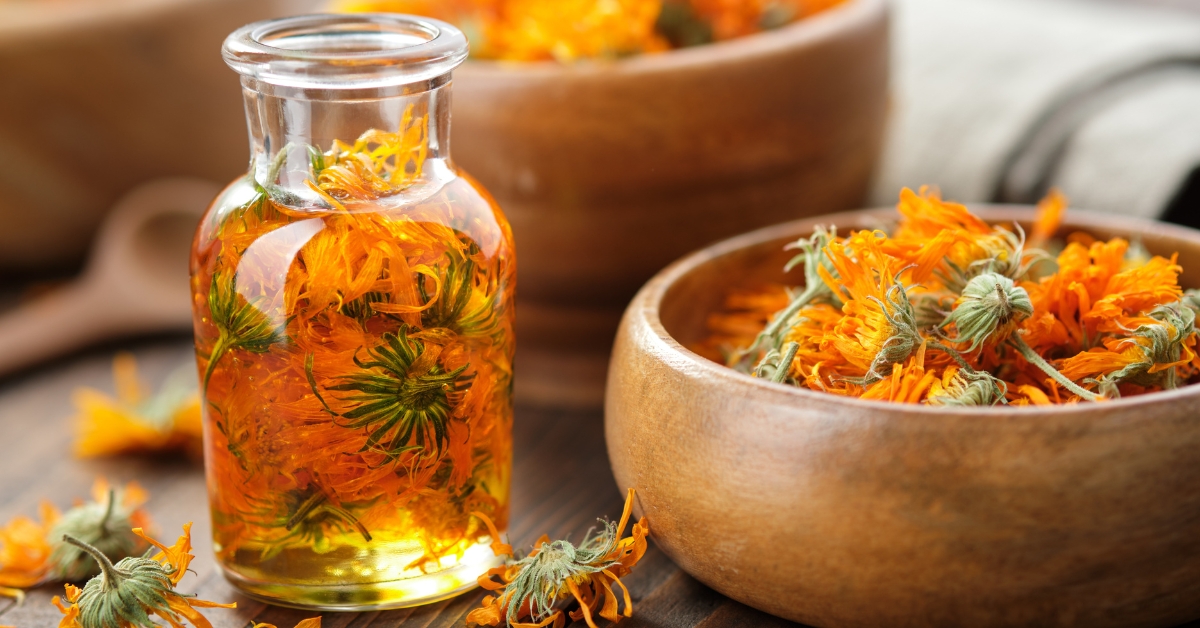
Healing Skin Salve
Ingredients:
- 2 tablespoons calendula-infused oil (made by steeping 1/4 cup dried calendula flowers in 1/2 cup olive oil for 2 weeks, then straining)
- 1 tablespoon beeswax pellets
- 1 teaspoon aloe vera gel
- 3 drops lavender essential oil
- 3 drops chamomile essential oil
Preparation:
- Melt beeswax in calendula oil using a double boiler.
- Remove from heat and stir in aloe vera gel and essential oils.
- Pour into a small jar and let cool.
- Apply to dry skin patches or minor irritations as needed.
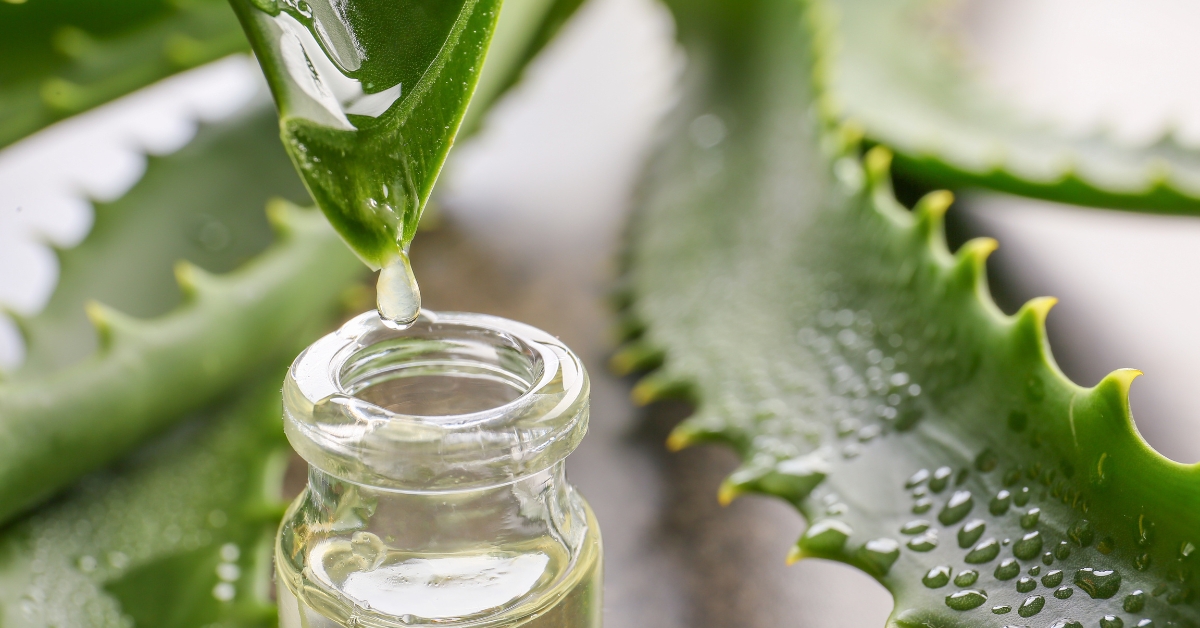
Clarifying Face Mask
Ingredients:
- 2 tablespoons kaolin clay
- 1 tablespoon aloe vera gel
- 1 teaspoon witch hazel extract
- 1 teaspoon chamomile infusion
- 3 drops lavender essential oil
Preparation:
- Mix all ingredients to form a paste.
- Apply to clean face, avoiding the eye area.
- Leave on for 10-15 minutes, then rinse with warm water.
- Use once or twice weekly to help reduce oil on acne-prone skin.
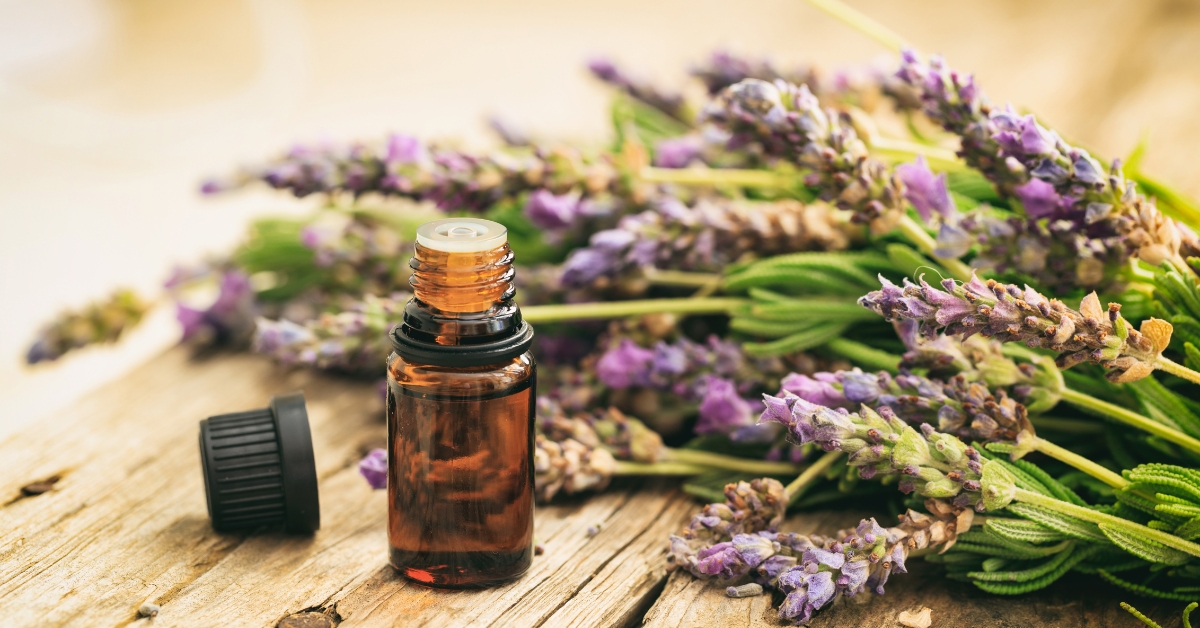
Nourishing Night Cream
Ingredients:
- 2 tablespoons shea butter
- 1 tablespoon calendula-infused oil (prepared as above)
- 1 teaspoon aloe vera gel
- 1/2 teaspoon vitamin E oil
- 3 drops lavender essential oil
- 3 drops chamomile essential oil
Preparation:
- Melt shea butter and calendula oil in a double boiler.
- Remove from heat and let cool slightly.
- Stir in aloe vera gel, vitamin E oil, and essential oils.
- Whip the mixture until light and fluffy.
- Store in a jar and apply nightly to cleansed skin on face and neck.
These gentle herbal preparations are designed to be easily integrated into basic skincare routines, providing a practical and enjoyable approach to naturally soothing and nurturing skin. Adjust the blends according to personal preference, and consult a healthcare provider before starting if you have sensitive skin, allergies, or skin conditions.
☯️ Integrating Herbs into Daily Life for Skin Health
Incorporating herbs into your daily skincare routine can improve your skin’s health and appearance. Here are some practical tips for using herbs effectively and complementary practices to maximize their benefits.
Daily Use and Lifestyle Integration
- 🌿 Herbal Cleansing: Start your day by washing your face with a gentle herbal cleanser containing chamomile or calendula. These herbs may help soothe and cleanse the skin without stripping it of natural oils.
- 🧼 Herbal Toners: After cleansing, use a witch hazel-based toner to help balance your skin’s pH and provide a temporary toning effect. You can make your own by mixing equal parts of witch hazel extract and distilled water.
- 🚿 Aloe Vera Gel: Apply a thin layer of pure aloe vera gel to your face and body after showering. This gel can help hydrate the skin and may soothe mild irritation or redness.
- 🫧 Herbal Moisturizers: Use a moisturizer containing lavender or calendula before bed to nourish your skin overnight. These herbs can help calm the skin and support its natural repair processes while you sleep.
Additional Practices to Support Skin Health
- 🥗 Healthy Diet: Consuming a diet rich in fruits, vegetables, and omega-3 fatty acids can support skin health from the inside out. Foods like berries, leafy greens, and fatty fish can provide essential nutrients beneficial for skin structure and appearance.
- 🫗 Hydration: Drinking plenty of water throughout the day helps keep your skin hydrated and supports overall cellular health and hydration. Consider drinking herbal teas like chamomile as an alternative, though they should not replace water intake.
- 🧘♀️ Stress Management: Practice stress-reduction techniques like meditation or yoga. Stress can negatively impact skin health, so managing it effectively may help support a clearer and more balanced complexion.
- ☀️ Sun Protection: Use a mineral sunscreen to protect your skin from harmful UV rays. Look for products that contain zinc oxide or titanium dioxide as active ingredients, as these are effective physical sunblocks.
- 🛀 Herbal Baths: Add chamomile or calendula flowers to your bathwater for a soothing, skin-nourishing soak. This can be especially comforting for mildly irritated or sensitive skin.
- 🤗 Horsetail Facial Rinse: Consider using horsetail in a diluted rinse, as it may benefit skin health due to its silica content, which could play a role in supporting collagen structure.
By integrating these herbal remedies and practices into your daily routine, you may support your skin’s natural health. Remember to patch test new products on a small skin area first to check for sensitivity before broader application.
🌱 Navigating Herbs Safely
Starting with small doses is the first step when adding herbal remedies to your health routine. This approach lets you see how you respond and adjust amounts for the best effect, keeping safety in mind. While many herbs are safe, everyone’s body reacts differently. If you notice any side effects, it’s important to stop and think about what might be causing them.
Remember, herbs can sometimes interact with prescription medicines. These interactions might make your medicines work too well or not well enough, so talking to a healthcare provider or an herbalist is essential. This is especially crucial if you’re pregnant, breastfeeding, taking medications regularly, or have an existing health condition. Getting advice tailored to your situation can help you avoid any unnecessary risks.
For kids and older adults, being extra careful with herbs is important. Their bodies might react more strongly to herbal remedies, and the chance of side effects or interactions could be greater. Before giving herbal treatments to children or elderly family members, getting advice from a professional is a must to ensure their safety.
By being cautious and seeking expert advice when needed, you can make herbal remedies a safe part of your wellness plan. This careful approach allows you to enjoy the benefits of herbs while keeping yourself and your family safe.
We focused on five key herbs for skin health: aloe vera, chamomile, calendula, lavender, and witch hazel. These herbs offer various benefits for common skin issues like acne, eczema, psoriasis, and minor wounds.
Aloe vera provides moisturizing and wound-healing properties. Chamomile helps reduce inflammation and soothes irritated skin. Calendula promotes skin regeneration and hydration. Lavender has antimicrobial and calming effects. Witch hazel acts as an astringent and can help with oily skin.
We included recipes for herbal skincare preparations, such as a soothing skin gel, calming facial mist, and healing salve. These DIY remedies allow for easy integration of herbs into daily skincare routines.
Tips for incorporating herbs into daily life include herbal cleansers, toners, and moisturizers. Complementary practices like maintaining a healthy diet, staying hydrated, managing stress, and using sun protection are also recommended to support overall skin health.
While herbs can offer natural solutions for many skin concerns, it’s important to consult a healthcare provider before starting any new herbal regimen, especially for those with sensitive skin or existing skin conditions.
FAQ
Are herbal remedies safe for all skin types?
Herbal remedies can be safe and beneficial for many skin types, but individual reactions vary widely. Herbs like aloe vera, chamomile, calendula, lavender, and witch hazel are often well-tolerated by a large number of people. However, even natural ingredients can cause allergic reactions or irritation in some individuals, especially those with more sensitive skin. It’s essential to perform a patch test before applying any new product to your face or body: apply a small amount of the herbal preparation to an inconspicuous area, such as the inside of your wrist, and wait 24 hours to monitor for any adverse reactions. If you have sensitive skin, eczema, or other skin conditions, consulting with a dermatologist or healthcare provider is recommended before incorporating new herbal remedies into your skincare routine. A professional can help identify which herbs might be most suitable for your specific skin type and concerns.
How long does it typically take to see results from using herbal skincare remedies?
The time it takes to see results from herbal skincare remedies varies based on factors such as the specific skin concern being addressed, the product formulation, frequency of use, and individual skin characteristics. For minor issues like mild irritation or dryness, improvements may be noticeable within a few days of using herbs like aloe vera or chamomile. For more persistent concerns, such as blemishes or dry patches, several weeks of consistent use may be needed to see visible changes. Herbs such as calendula and witch hazel may require 4-6 weeks of regular application to show noticeable benefits in skin appearance and texture. Since herbal remedies often work more gently and gradually than synthetic treatments, patience and consistency are important. If you do not observe improvement after 6-8 weeks or if your skin condition worsens, consulting with a healthcare professional is recommended for further guidance.
Can I use multiple herbs in my skincare routine simultaneously?
Yes, you can use multiple herbs in your skincare routine simultaneously, and in many cases, this can be beneficial as different herbs offer complementary effects. For example, aloe vera can provide soothing and hydrating benefits, witch hazel may act as a mild astringent, and lavender may have calming effects. However, it's essential to introduce new herbs or products gradually into your routine. Start by incorporating one new herbal remedy at a time, using it consistently for at least a week before adding another. This method helps you observe how your skin responds to each herb individually. When combining herbs, be mindful of your skin’s tolerance and avoid using multiple products with potent active compounds at once, as this can lead to irritation. A simple, balanced routine often supports optimal skin health. If you’re uncertain about combining specific herbs or have concerns about potential interactions, consult a dermatologist or qualified herbalist for personalized guidance.

